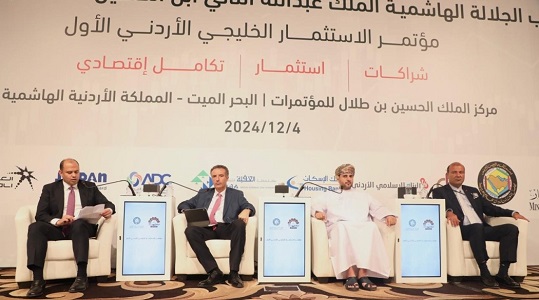The Secretary-General of the Union of Arab Chambers held a series of meetings and talks with a number of senior Jordanian officials, where he met with the Prime Minister of the Hashemite Kingdom of Jordan, Jaafar Abdel Fattah Hassan, the Minister of Industry and Trade, His Excellency Yarub Falah Al-Qudah, and the Minister of Investment, His Excellency Eng. Muthanna Hamdan Alyan Gharaibeh, during his participation in the work of the First Gulf-Jordanian Investment Conference, which was held at the Dead Sea on 4- 12-2024 with prominent Jordanian, Gulf and Arab participation.
During the meetings, they discussed mechanisms and ways to enhance joint Arab efforts in various fields, especially at the trade and investment levels, especially in promising new sectors that are in line with the Fourth Industrial Revolution, the digital economy, the green economy, and other sectors that would raise the level of inter-Arab economic cooperation.
The Secretary General of the Union spoke during his participation in the work of the "Investment and Economic Integration" session, within the work of the first Gulf-Jordanian Investment Conference, "as this conference comes as a strategic platform to enhance economic cooperation and achieve fruitful partnerships between the Gulf Cooperation Council countries and the Hashemite Kingdom of Jordan."
The Secretary-General of the Union noted that the Arab region has witnessed in recent years unprecedented challenges at the economic and social levels, as statistics indicate that intra-Arab trade constitutes only about 12 percent of the total Arab foreign trade, which highlights the urgent need for greater economic integration to achieve sustainable development.
"The GCC countries and Jordan have enormous potential that could put them at the forefront of successful models of regional economic integration. Economic relations between Jordan and the Arab Gulf countries are one of the most important axes of regional cooperation. Historically, these relations have been based on solid foundations of trade and investment cooperation. According to statistics, the volume of trade between Jordan and the Gulf countries amounted to about $ 5 billion in 2023, with an annual growth of 10 percent.
Dr. Khaled Hanafi explained that "intra-Jordanian trade with the Gulf countries represents about 15 percent of Jordan's total foreign trade. This figure reflects the importance of the Gulf market for the Jordanian economy. The Gulf countries are among the largest investors in Jordan, with Gulf investments in the Kingdom exceeding $12 billion, contributing to economic growth and job creation."
The Secretary-General said that energy is one of the key sectors that can contribute to promoting integration. The Arab Gulf states have a high percentage of the world's oil reserves, while Jordan has great potential for the development of renewable energy. Investment in solar and wind projects can form the basis for joint cooperation to meet the region's clean and sustainable energy needs.
In the area of food and agricultural security, the FAO report indicates that the Arab world imports about 50 percent of its food needs. Thus, partnerships in the agriculture and food security sector can be strengthened through direct investments in modern agricultural technologies and exchanging experiences between the two sides. According to the World Bank, improving transport infrastructure could boost intraregional trade by up to 20 percent in the transport and logistics sector. Thus, linking the Gulf markets to Jordan through innovative logistics projects contributes to facilitating the movement of trade and increasing the flow of investments."
"Studies show that the digital economy could contribute 15% to the Arab GDP by 2030. In doing so, investment in technology and digital transformation will open up new avenues for collaboration in sectors such as financial services, e-commerce, and innovation."
In his speech, Dr. Khaled Hanafi highlighted that "as a representative of the Arab private sector, the Union of Arab Chambers plays a pivotal role in supporting and promoting economic integration by strengthening partnerships between the public and private sectors through the organization of economic forums and bilateral meetings between investors. In addition to providing economic information and data: which facilitates making investment decisions based on scientific foundations. As well as supporting co-investment initiatives: especially in priority sectors such as industry, technology, and services.
The Union of Arab Chambers is committed to working with all partners to promote economic integration and support joint efforts to achieve sustainable development and prosperity for our people. He called for "the need to establish strategic partnerships between the public and private sectors to promote joint investments. In addition, work to simplify legal and administrative procedures to attract more investments. In my view, investing in human skills development is the key to success. Therefore, we must support training and professional development programs to raise the efficiency of the workforce. Establishing joint electronic platforms that bring together investors from both sides to exchange information and facilitate cooperation. As well as activating existing economic agreements and developing new mechanisms to follow up their implementation on the ground".
Source (Union of Arab Chambers)

